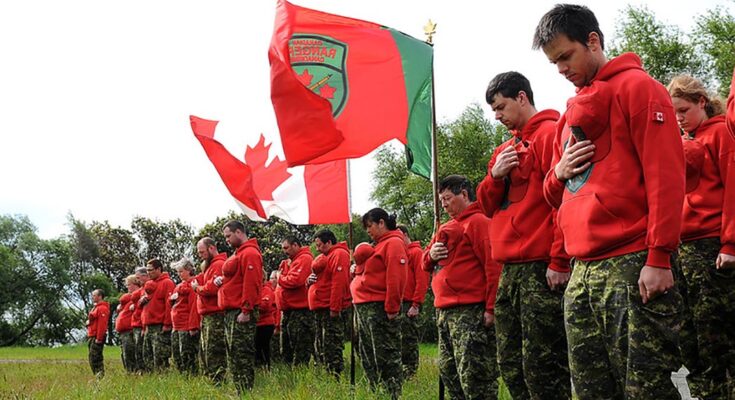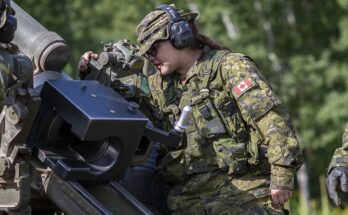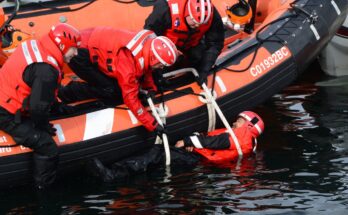Canadian Rangers Recruitment: The Canadian Rangers, a vital component of Canada’s military reserves, offer a unique opportunity for individuals seeking to serve their country while maintaining their civilian lifestyle.
This article delves into the comprehensive recruitment programs of the Canadian Rangers, outlining the benefits, requirements, and application process to aid potential applicants in making an informed decision.
Brief History of the Canadian Rangers
The Canadian Rangers were officially formed in 1947, though their roots trace back to the early days of World War II. Initially, they were established to provide a military presence in the remote, northern, and coastal areas of Canada that were less accessible to conventional military forces. Over the decades, the Rangers have evolved, but their core mission of surveillance and sovereignty in isolated regions has remained constant.
Detailed Explanation of Their Role in Canada’s National Defense and Community Support
The primary role of the Canadian Rangers is to serve as the eyes and ears of the Canadian Armed Forces in sparsely settled northern, coastal, and isolated areas of Canada. They play a crucial role in national defense by conducting sovereignty patrols and reporting unusual activities, environmental changes, and other potential threats to Canadian security.
Additionally, the Rangers are deeply involved in community support. They assist in local emergencies like search and rescue operations, natural disaster responses, and provide crucial support in remote areas. This dual role in defense and community assistance underlines their significance beyond mere military presence.
Highlighting Unique Aspects of Being a Canadian Ranger
Being a Canadian Ranger is a role unlike any other in the military. Rangers are typically part-time reservists who live in the communities they serve, which gives them a unique understanding of the local environment and needs. They are known for their distinctive red hoodies and baseball caps, symbolizing their unique identity.
Moreover, the Rangers are renowned for their skills in survival, navigation, and knowledge of the local terrain, making them invaluable in operations in Canada’s most challenging environments. Their ability to work closely with Indigenous communities, respecting local customs and knowledge, further sets them apart.
However, the Canadian Rangers represent a vital and unique component of Canada’s defense and community support. Their history, role, and unique aspects not only contribute to Canada’s national security but also embody the spirit of resilience and community service.
Who Can Apply? Eligibility Criteria
Are you interested in joining the Canadian Rangers? This prestigious group plays a crucial role in safeguarding Canada’s remote, coastal, and isolated regions. Before you apply, it’s essential to understand the eligibility criteria. Here’s a detailed breakdown:
- Age Requirements: To become a Canadian Ranger, you must be of a certain age. Typically, candidates are required to be adults, but the specific age range can vary. Check the latest guidelines to confirm the age bracket.
- Citizenship: A fundamental requirement is Canadian citizenship. This ensures that those serving are legally recognized as members of the country they are protecting.
- Physical Fitness: Rangers often operate in challenging environments. Physical fitness is not just recommended but necessary. Prospective Rangers must meet specific physical standards to ensure they can handle the demanding tasks of the role.
- Additional Qualifications: Beyond age and physical fitness, there may be other qualifications, such as educational requirements, previous military service, or specific skills relevant to the Ranger role. Always refer to the latest recruitment information for details.
- Personal Qualities: The Canadian Rangers look for individuals with certain personal qualities. Integrity, resilience, and a commitment to community service are highly valued. Rangers are more than soldiers; they are community leaders and role models.
Remember, these criteria are a general guide. For the most current and detailed information, visit the official Canadian Rangers website or contact their recruitment office. Joining the Canadian Rangers is a noble endeavor, offering a unique opportunity to serve your country and community.
Benefits of Joining the Canadian Rangers
Joining the Canadian Rangers offers a unique blend of opportunities that contribute to personal growth, skill development, and community service. This section delves into the multifaceted benefits that come with being a part of this esteemed organization.
Comprehensive Training
The Canadian Rangers are renowned for their specialized training programs. As a member, you will receive top-notch training in a variety of areas such as survival skills, first aid, and environmental stewardship. This training not only equips you with valuable skills but also enhances your ability to respond effectively in emergency situations, both in your community and beyond.
Community Involvement and Support
One of the core missions of the Canadian Rangers is to provide support to remote, northern, and isolated communities. By joining, you become an integral part of a team that plays a crucial role in these communities. This involves participating in search and rescue missions, environmental monitoring, and community-based activities. Such involvement fosters a strong sense of belonging and contributes significantly to the well-being and safety of these communities.
Personal Development and Growth
Being a Ranger offers more than just physical and skills training. It’s a journey of personal development. Members often speak about the increased self-confidence, leadership skills, and a sense of purpose they gain. The experience of working in diverse environments and facing unique challenges promotes resilience and adaptability, traits that are invaluable in all walks of life.
Testimonials from Rangers
“To be a Canadian Ranger is to be a part of something bigger than yourself. The skills I’ve learned and the experiences I’ve had are incomparable. It’s not just about the training, but about the people you meet and the communities you serve.” – John Doe, a serving Ranger.
“I served as a Canadian Ranger for five years. The sense of community and purpose I felt during my service has been unparalleled. It taught me leadership, resilience, and the importance of cultural sensitivity.” – Jane Smith, a former Ranger.
Joining the Canadian Rangers is more than just a commitment; it’s an opportunity to grow, learn, and make a meaningful impact in the lives of others and in your personal development. Whether it’s through the extensive training, community service, or the personal growth you experience, being a part of the Canadian Rangers is a rewarding and enriching journey.
Recruitment Process: Step-by-Step Guide for Canadian Rangers
Joining the Canadian Rangers is a unique and fulfilling opportunity for those interested in serving their community and country. This guide provides a comprehensive overview of the recruitment process, ensuring you are well-prepared at every step.
- Initial Application: Start by visiting the official Canadian Armed Forces (CAF) website. Here, you can find the specific requirements for the Canadian Rangers and the online application form. It’s essential to meet all the basic eligibility criteria, including age, citizenship, and health standards.
- Gathering Documentation: Prepare all necessary documents in advance. This typically includes identification proof, educational certificates, and any other relevant qualifications. Having these documents ready will speed up the application process.
- Submission and Confirmation: Once you’ve completed the application form and attached all required documents, submit your application. You will receive a confirmation and further instructions on the next steps.
- Assessment and Interviews: The selection process involves a series of assessments and interviews. These are designed to evaluate your physical fitness, aptitude, and alignment with the Rangers’ values and mission. It’s a good idea to prepare by researching the Canadian Rangers’ role and responsibilities.
- Selection Process: Based on the assessments and interviews, candidates are selected for the Canadian Rangers. The selection criteria are stringent, ensuring only the most suitable candidates are chosen.
- Training and Induction: Once selected, you will undergo comprehensive training. This training is crucial as it equips you with the necessary skills and knowledge to perform your duties effectively.
Tips for a Successful Application:
- Research Thoroughly: Understand the role and responsibilities of a Canadian Ranger. This knowledge will not only help in the interview but also confirm if this is the right path for you.
- Prepare Your Documents: Ensure all your documents are up-to-date and readily available. This shows your seriousness and preparedness for the application process.
- Physical Fitness: The Canadian Rangers require a good level of physical fitness. Engage in regular exercise to improve your fitness levels.
- Practice for Assessments: Familiarize yourself with the types of assessments that may be involved in the selection process.
- Be Genuine: During interviews, be honest and genuine. The selectors are looking for individuals who are truly passionate about serving their community and country.
Embarking on the journey to become a Canadian Ranger is both exciting and demanding. Following this step-by-step guide will help you navigate the recruitment process with confidence and clarity, bringing you one step closer to serving your country with pride.
Training and Responsibilities of Canadian Rangers
The journey of a Canadian Ranger begins with a comprehensive training program, designed to equip new recruits with the skills and knowledge necessary for their unique roles. This training includes a blend of both traditional and modern techniques, tailored to prepare individuals for the diverse challenges they may face. Recruits learn essential survival skills, first aid, navigation, and emergency response tactics, all crucial for operating effectively in Canada’s remote and often harsh environments.
Key Responsibilities and Duties
Canadian Rangers play a pivotal role in national security and community support. Their responsibilities are multi-faceted, involving:
- Surveillance and Sovereignty Patrols: Rangers conduct regular patrols, contributing to Canada’s sovereignty and territorial integrity.
- Search and Rescue Operations: They are often the first responders in remote areas, adept at conducting search and rescue missions.
- Environmental Stewardship: Rangers monitor ecological changes and contribute to environmental conservation efforts.
- Community Assistance: They provide vital support during emergencies, natural disasters, and in community development projects.
- Cultural Preservation: Rangers also play a key role in preserving Indigenous cultures and traditions, integrating this knowledge into their operations.
Day-to-Day Life
The day-to-day life of a Canadian Ranger is dynamic and fulfilling. Rangers often find themselves in varied environments, from dense forests to icy terrains. A typical day might involve training sessions, community meetings, or patrol missions. Despite the challenging conditions, the role is incredibly rewarding, offering a sense of camaraderie and community impact. Rangers are respected community members, valued for their skills, resilience, and dedication to both their local communities and the nation.
How to Prepare for a Career as a Canadian Ranger
Embarking on a career as a Canadian Ranger is a commendable aspiration, offering a unique blend of adventure, patriotism, and community service. This guide provides essential advice on physical, mental, and educational preparation, along with relevant courses and experiences that could be beneficial for aspiring Canadian Rangers.
Physical Preparation
- Regular Exercise: Start a fitness regime that includes cardiovascular exercises, strength training, and flexibility workouts. Rangers often operate in challenging terrains, so endurance and physical robustness are crucial.
- Outdoor Skills: Engage in outdoor activities like hiking, camping, and survival training. These skills are vital as Rangers frequently work in remote and wilderness areas.
- First Aid Training: Basic first aid knowledge is a significant asset. Consider enrolling in courses to obtain a certification.
Mental Preparation
- Resilience Training: Rangers often face challenging and stressful situations. Engaging in activities that build mental toughness, like meditation or team sports, can be beneficial.
- Adaptability Skills: Being adaptable to different environments and situations is key. Try to expose yourself to various experiences that take you out of your comfort zone.
Educational Preparation
- Relevant Courses: While specific educational requirements may vary, taking courses in areas like environmental science, geography, or even military history can be advantageous.
- Language Skills: As Canada is bilingual, proficiency in both English and French can be an asset. Consider language courses if you’re not already bilingual.
Beneficial Experiences
- Volunteer Work: Involvement in community service or volunteer groups demonstrates a commitment to community—a core value for Canadian Rangers.
- Participation in Cadets or Reserves: Experience in the Canadian Cadets or Reserves can provide a glimpse into military life and structure, which is beneficial for a career as a Ranger.
- Networking: Attend events or join forums related to Canadian defense and environmental stewardship to connect with professionals and learn from their experiences.
By focusing on these key areas, you can effectively prepare for a rewarding and fulfilling career as a Canadian Ranger. Remember, being a Ranger is not just about physical strength, but also about mental resilience, dedication to community, and a continuous willingness to learn and adapt.
Frequently Asked Questions About Canadian Ranger Recruitment and Life as a Ranger
1. What are the Requirements to Become a Canadian Ranger?
To become a Canadian Ranger, candidates must meet specific criteria, including age, citizenship, and physical fitness requirements. It’s important to check the latest guidelines on the official Canadian Armed Forces website for the most current information.
2. How Do I Apply to Become a Canadian Ranger?
The application process for becoming a Canadian Ranger involves several steps, including submitting an application, undergoing a background check, and completing interviews. Detailed instructions are available on the Canadian Armed Forces recruitment page.
3. What Kind of Training Do Canadian Rangers Receive?
Canadian Rangers undergo unique training tailored to their roles, which includes survival skills, first aid, and specific military training. This training equips them to effectively operate in Canada’s remote and isolated regions.
4. Are There Any Special Programs for Youth in the Rangers?
Yes, the Junior Canadian Rangers program is designed for youth aged 12 to 18. It focuses on developing leadership, outdoor survival skills, and fostering a strong sense of community.
5. What Roles Do Canadian Rangers Play?
Canadian Rangers are vital in conducting sovereignty patrols, providing local expertise, assisting in search and rescue operations, and supporting national defense and community development in remote areas.
6. How Often Do Rangers Deploy?
The frequency of deployments varies based on need and location. Rangers should be prepared for both routine activities and emergency response in their regions.
7. Can I Continue My Civilian Job While Serving as a Ranger?
Yes, serving as a Canadian Ranger is typically a part-time commitment, allowing individuals to maintain their civilian careers while serving their country.
8. What Support is Available for Rangers and Their Families?
The Canadian Armed Forces offer various support systems for Rangers and their families, including access to resources for health, education, and family support.
9. Are There Opportunities for Career Advancement Within the Rangers?
Opportunities for advancement and additional training are available for Canadian Rangers, allowing them to take on more responsibilities and leadership roles within the organization.
10. Where Can I Find More Information About Life as a Canadian Ranger?
For more detailed information, visit the official Canadian Armed Forces website or contact a local recruitment center. They can provide insights into the day-to-day life of a Ranger and additional resources.
Apply Now
Conclusion
If you are a Canadian citizen or a permanent resident living in one of Canada’s remote, coastal, or northern communities, you may be eligible to join this distinguished group. Becoming a Canadian Ranger not only allows you to serve your country but also offers a chance to enhance your skills, engage with your community, and participate in meaningful missions that make a real difference.
We encourage those who meet the eligibility criteria and have a passion for serving their community and country to consider applying. Joining the Canadian Rangers is more than just a commitment; it’s an opportunity to be part of a proud legacy that shapes Canada’s presence in some of the most challenging yet beautiful parts of our nation.
Take the first step today: visit the official Canadian Armed Forces website to learn more about the recruitment process and how you can contribute to this remarkable group. Your journey as a Canadian Ranger awaits, and your contribution could make a significant impact on the future of our country.
Become a Canadian Ranger – Serve, Protect, and Connect with your Community.



